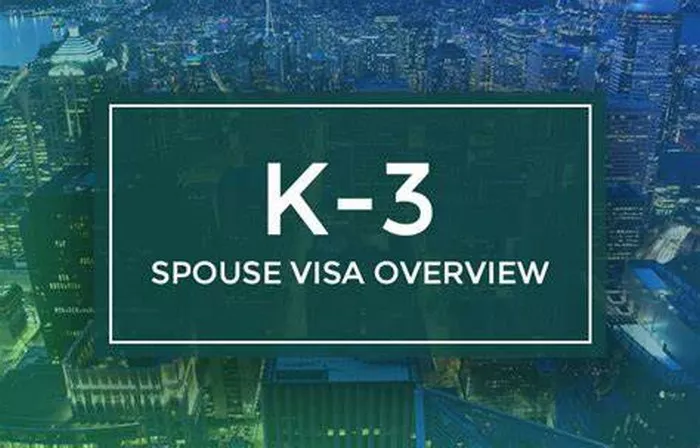In the realm of U.S. immigration, the K3 visa stands as a pivotal tool for facilitating the reunification of families separated by international borders. Designed to expedite the immigration process for spouses of U.S. citizens, the K3 visa holds significant importance for couples seeking to live together in the United States. This article aims to provide a comprehensive overview of the K3 visa, exploring its eligibility criteria, application process, benefits, limitations, and frequently asked questions.
What is a K3 Visa?
The K3 visa, formally known as the K-3 nonimmigrant visa, is a temporary visa category created to shorten the physical separation between U.S. citizens and their foreign-national spouses during the immigration process. It was established as part of the Legal Immigration Family Equity (LIFE) Act of 2000 to address the lengthy delays associated with the traditional immigrant visa process for spouses of U.S. citizens.
Eligibility Criteria
To be eligible for a K3 visa, the applicant must meet certain requirements:
1. Marriage to a U.S. Citizen: The applicant must be legally married to a U.S. citizen.
2. Pending Immigrant Visa Petition: The U.S. citizen spouse must have filed an immigrant visa petition (Form I-130) on behalf of the foreign-national spouse.
3. Intent to Immigrate: The foreign-national spouse must intend to immigrate to the United States to live with their U.S. citizen spouse.
4. Admissibility: The applicant must meet the general admissibility requirements for entry into the United States, including passing background and medical examinations.
Application Process
The process of obtaining a K3 visa involves several steps:
1. Form I-130 Petition: The U.S. citizen spouse initiates the process by filing Form I-130, Petition for Alien Relative, with U.S. Citizenship and Immigration Services (USCIS).
2. Form I-129F Petition: After filing the Form I-130, the U.S. citizen spouse submits Form I-129F, Petition for Alien Fiancé(e), on behalf of the foreign-national spouse. This petition requests K3 visa classification for the spouse.
3. Consular Processing: Once USCIS approves the Form I-129F petition, it is forwarded to the National Visa Center (NVC) for further processing. The foreign-national spouse then completes the required forms and undergoes a visa interview at the U.S. embassy or consulate in their home country.
4. Medical Examination and Background Checks: As part of the visa application process, the foreign-national spouse must undergo a medical examination and provide documentation of their criminal history, if applicable.
5. K3 Visa Issuance: If the consular officer approves the visa application, the foreign-national spouse receives a K3 visa, allowing them to enter the United States.
Benefits of a K3 Visa
The K3 visa offers several benefits for couples navigating the immigration process:
1. Faster Reunification: The K3 visa expedites the process of bringing spouses together by allowing the foreign-national spouse to enter the United States while awaiting the approval of their immigrant visa petition.
2. Work Authorization: K3 visa holders are eligible to apply for employment authorization, enabling them to work legally in the United States while waiting for their immigrant visa to be processed.
3. Travel Flexibility: K3 visa holders can freely travel in and out of the United States during the validity of their visa, facilitating visits to family members and international travel.
4. Eligibility for Adjustment of Status: Upon arrival in the United States, K3 visa holders can apply for adjustment of status to obtain lawful permanent resident status without the need to return to their home country.
Limitations of a K3 Visa
Despite its advantages, the K3 visa also has limitations that applicants should consider:
1. Limited Validity: The K3 visa is typically valid for two years, during which the foreign-national spouse must complete the immigration process and obtain permanent resident status.
2. Dependent Children: While the K3 visa allows the foreign-national spouse to accompany their U.S. citizen spouse to the United States, it does not automatically extend to dependent children. Separate visa applications may be required for accompanying children.
3. Immigration Scrutiny: K3 visa applicants are subject to thorough vetting by immigration authorities, including background checks and interviews, which can result in delays or denials.
4. Conditional Residency: In some cases, foreign-national spouses who obtain permanent resident status through the K3 visa may receive conditional residency, which requires additional steps to remove conditions on their status.
Conclusion
The K3 visa serves as a valuable tool for facilitating the reunification of families separated by international borders. By providing an expedited pathway for spouses of U.S. citizens to join their partners in the United States, the K3 visa helps alleviate the burden of prolonged separation and promotes family unity. However, applicants should be aware of the eligibility criteria, application process, benefits, and limitations associated with the K3 visa to make informed decisions about their immigration journey.


